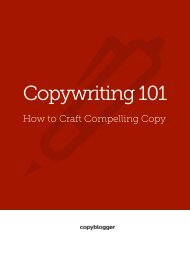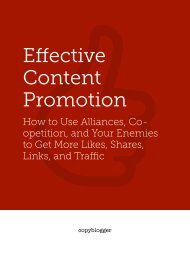Create successful ePaper yourself
Turn your PDF publications into a flip-book with our unique Google optimized e-Paper software.
<strong>Keyword</strong><br />
<strong>Research</strong><br />
A Real-World Guide
KEYWORD RESEARCH: A REAL WORLD GUIDE<br />
<strong>Keyword</strong> <strong>Research</strong><br />
Copyright © 2014 Copyblogger Media, LLC<br />
All Rights Reserved<br />
Feel free to email, tweet, blog, and pass this ebook around the web ... but please<br />
don’t alter any of its contents when you do. Thanks!<br />
copyblogger.com<br />
2
KEYWORD RESEARCH: A REAL WORLD GUIDE<br />
<strong>Keyword</strong> research is a fundamental part of online marketing of all kinds, and is<br />
especially relevant for freelance writers, online publishers, and bloggers.<br />
Compelling content is favored by search engines, but if you don’t use the<br />
words people are actually interested in and actively searching for, you’re<br />
missing a lot of traffic.<br />
But the value of keywords goes well beyond SEO copywriting. In fact, close<br />
your eyes for a moment and imagine a world where search engines don’t<br />
deliver traffic at all.<br />
Would keyword research still be valuable? You bet.<br />
<strong>Keyword</strong> research, at its essence, is market research. It tells you what people<br />
are interested in, and in what relative numbers.<br />
Better yet, it reveals the actual language people are using when they think<br />
about those topics, which provides you with insight on how to converse with<br />
them via your blog.<br />
That information is worth its weight in gold, if you know what to do with it. And<br />
that’s what this ebook is all about.<br />
Let’s get going ...<br />
3
KEYWORD RESEARCH: A REAL WORLD GUIDE<br />
<strong>Keyword</strong> <strong>Research</strong>: It’s Not What You<br />
Think<br />
by Brian Clark<br />
“Words are powerful,” my teacher said, looking out over my 7th grade English<br />
class. “These little blotches of ink have overthrown kings, governed religions,<br />
and caused millions of men and women to fall in love.”<br />
Yes, it was a tad dramatic, but my 13-year-old heart started racing. Those were<br />
the words that launched my writing career.<br />
For the last 12 years, I’ve been on a continuous quest to master the power of<br />
words, to wield them with great eloquence and effect. I’ve written thousands<br />
of pages, read hundreds of books, and now I’m making a living with nothing<br />
but words.<br />
And I’ve learned one thing: my teacher was wrong. Words aren’t powerful.<br />
The right words are.<br />
What’s the difference between a headline that goes viral on Twitter and<br />
Facebook and one that’s ignored? The right words.<br />
4
KEYWORD RESEARCH: A REAL WORLD GUIDE<br />
What’s the difference between a blog post that receives hundreds of referrals<br />
from search engines or none at all? The right words.<br />
What’s the difference between an opening paragraph that grabs the attention<br />
of your readers and one that has them looking for the Back button? The right<br />
words.<br />
Choose the right words, and you’ll receive traffic, subscribers, revenue,<br />
influence … everything you need to be a success. Choose the wrong words,<br />
and you’ll be just another nobody that doesn’t get it, forever clamoring for<br />
attention but forever ignored.<br />
So where do you find the right words? You guessed it—by understanding<br />
what copywriting is really all about.<br />
The Origin of <strong>Keyword</strong> <strong>Research</strong><br />
There is your audience. There is the language. There<br />
are the words that they use. ~ Eugene Schwartz<br />
Hang around the web long enough, and you’ll hear Search Engine<br />
Optimization (SEO) experts raving about keyword research. But they weren’t<br />
the first ones to start talking about it. Copywriters were researching their<br />
5
KEYWORD RESEARCH: A REAL WORLD GUIDE<br />
“keywords” long before search engines even existed.<br />
The above quote is from Eugene Schwartz, one of the most influential<br />
copywriters in the history of the craft. It’s a piece of the following, much longer<br />
quote from the 1960s:<br />
One hour a day, read. Read everything in the world<br />
except your business. Read junk. Very much junk.<br />
Read so that anything that interests you will stick in<br />
your memory. Just read, just read, just read… There is<br />
your audience. There is the language. There are the<br />
words that they use.<br />
He’s referring to studying your audience. Before writing a single word of their<br />
sales letter, top copywriters spend weeks or months talking to prospects,<br />
reading their favorite magazines, and studying sales letters that have worked<br />
(or even failed) with that audience in the past.<br />
Why? To find the right words.<br />
At the deepest level, keyword optimization has nothing to do with SEO. It’s<br />
about knowing your audience so well that you learn which words will grab<br />
their attention, earn their trust, and persuade them to buy your products or<br />
6
KEYWORD RESEARCH: A REAL WORLD GUIDE<br />
services in the future. You have to “optimize” your writing for maximum effect.<br />
Sound like work? It is… but not nearly as much as it used to be. Where Eugene<br />
Schwartz and his colleagues spent months analyzing a niche, you can do your<br />
research in a matter of minutes using the latest keyword research tools.<br />
How to Build a Popular Blog with <strong>Keyword</strong><br />
<strong>Research</strong><br />
If you’re thinking about starting your first blog or enhancing your existing one,<br />
“keyword research” can sound technical and intimidating to the uninitiated.<br />
Really though, it’s pretty straightforward.<br />
<strong>Keyword</strong> research tools like Wordze, <strong>Keyword</strong> Discovery, and Wordtracker<br />
estimate the number of times people search for different phrases. For instance,<br />
according to Wordze, approximately 11,222 people search for the term<br />
“blogging” each month.<br />
Estimations from keyword research tools are rarely accurate, so you shouldn’t<br />
expect to receive 11,222 visitors per month if you show up first when someone<br />
types “blogging” into Google. It might be significantly less or more (ask Darren<br />
of Problogger).<br />
You can gauge the popularity of a topic relative to other topics. For instance,<br />
the general term “blogging” is more popular than the more specific term<br />
7
KEYWORD RESEARCH: A REAL WORLD GUIDE<br />
“business blogging,” which only has an estimated 3,319 searches per month.<br />
But keyword research is about more than traffic. It’s about understanding your<br />
niche from the inside out. You can use it to help you choose:<br />
• A popular (or profitable) niche for your blog<br />
• Post topics that people want to read about<br />
• Related markets to tap into<br />
• Products and services to promote (for a fee) on your blog<br />
• Ads that will bring you the highest cost per click (CPC)<br />
Now, let’s go through each part, step-by-step ...<br />
8
KEYWORD RESEARCH: A REAL WORLD GUIDE<br />
How to Choose a Profitable Niche<br />
Will anyone read the online content I produce?<br />
It’s a terrifying question, but an important one. If you’re committed to building<br />
a popular and profitable site, you’ll have to write, read, and talk about your<br />
topic almost every day for the next several years. You’ll invest thousands of<br />
hours, quite literally gambling with your time.<br />
The question is, how will you approach it? Will you start writing and hope<br />
someone notices you? Or will you carefully research your niche, looking for the<br />
precise angle that will make your content irresistible?<br />
I’ve tried both, and I recommend the latter.<br />
It’s never possible to know for sure whether people will like your content<br />
before you create it, but keyword research sure helps. You can see how many<br />
people are searching for your topic in the search engines, and you can use it to<br />
compare different topics to each other and gauge their popularity.<br />
A Real World Example—A Mixed Martial Arts Blog<br />
A friend of mine is thinking about starting a blog on Mixed Martial Arts<br />
(sometimes called ultimate fighting). He’s an expert in the niche, and while the<br />
sport is certainly growing, he was wondering whether anyone is looking for<br />
9
KEYWORD RESEARCH: A REAL WORLD GUIDE<br />
information online.<br />
So I decided to look it up for him using Wordtracker. Using their <strong>Keyword</strong><br />
<strong>Research</strong>er tool, I searched for “mixed martial arts” and here were the first few<br />
results:<br />
I was a little surprised:<br />
Considering all of the mainstream news and television coverage they’re<br />
getting now, I expected more than 352 searches per day<br />
10
KEYWORD RESEARCH: A REAL WORLD GUIDE<br />
Out of the next most popular keywords, people were looking for “gear” and<br />
“seminars,” meaning the searchers want to participate in the sport, not just<br />
watch it<br />
With people searching for information about Atlanta, New York, and Australia,<br />
it shows that there’s strong interest in local training and other events<br />
Finding Related <strong>Keyword</strong>s to Target<br />
All of that information is useful, but I know next to nothing about mixed<br />
martial arts, so I suspected I was missing something. I decided to “dig” a little<br />
further with Wordtracker’s <strong>Keyword</strong> Universe tool—a nifty little program that<br />
searches the web for related keywords. After a few minutes, it spit out the<br />
following results:<br />
11
KEYWORD RESEARCH: A REAL WORLD GUIDE<br />
Both “MMA” and “mma” are in the search results. I’m guessing they’re an<br />
abbreviation for Mixed Martial Arts, so let’s take a look at them:<br />
Now we’re getting somewhere! If we combine their daily search totals, nearly<br />
three times as many people search for “MMA” as “mixed martial arts.” With<br />
more people using the abbreviation than the full term, we might also infer<br />
that this audience is already very familiar with the niche.<br />
Still, let’s back away from that for a moment and look at the sixth related<br />
keyword from above: UFC.<br />
<strong>Research</strong>ing Related Markets<br />
As it turns out, UFC stands for Ultimate Fighting Championship. It’s the name<br />
of the main mixed martial arts league, kind of like NFL for football or NBA for<br />
basketball. Let’s take a look at the traffic it receives, once again looking at both<br />
the uppercase and lowercase keywords:<br />
12
KEYWORD RESEARCH: A REAL WORLD GUIDE<br />
Wow! If we combine the predicted daily traffic, “UFC” is receiving 7,098<br />
searches per day—more than seven times the traffic of “MMA.” Even longer<br />
terms with “ufc” in them, such as “ufc 79,” “ufc 81,” and so on receive significant<br />
traffic.<br />
Having no idea what 79 and 81 mean, I searched for them both in Google, and<br />
it looks like the numbers represent individual UFC events, kind of like boxing<br />
13
KEYWORD RESEARCH: A REAL WORLD GUIDE<br />
matches. People are looking for more information on great fights from the<br />
past.<br />
Interpreting Your <strong>Keyword</strong> <strong>Research</strong> Results<br />
I didn’t include the full list, but some of the other popular keywords for “UFC”<br />
are “ufc knockouts,” “ufc fighters,” and “ufc videos.” Unlike the results for “mma,”<br />
we don’t see nearly as many searches for different types of gear and training.<br />
What does that mean? Well, here’s what I think:<br />
• The people who search for “MMA” are either interested in becoming an<br />
MMA fighter, or they already are one<br />
• The people who search for “UFC” are fans, mostly just interested in<br />
watching the events and following the fighters<br />
• Because there are obviously more fans than fighters, a website targeting<br />
the fans and the “UFC” keywords would probably get more traffic<br />
• Because of the searches for different types of gear with “MMA,” you<br />
might be able to make more money targeting people directly involved<br />
in the sport<br />
• Each set of keywords represents a completely different niche with its<br />
own advantages and disadvantages<br />
14
KEYWORD RESEARCH: A REAL WORLD GUIDE<br />
Is this useful information? You betcha.<br />
In marketing, one of the most important steps you can take is to segment<br />
your audience. If you can divide them by their interests, then you can craft a<br />
message that’s perfectly targeted at the group you want to pursue. It makes it<br />
much, much easier to grab their attention.<br />
In my friend’s case, he only wants to target fighters. He has no desire<br />
whatsoever to become just another reporter on the individual events. The<br />
purpose of starting the blog is to build his authority as a mixed martial arts<br />
expert and eventually make a living from training fighters.<br />
Obviously, he should focus on the “MMA” keyword set. All of the keywords<br />
within that category are distinctly related to his audience. Not only does the<br />
data allow him to narrow his focus down to a specific niche, but it shows him<br />
which topics to write about, as well as several ways to make money.<br />
Want to find out how? Keep reading, and I’ll show you how to turn your<br />
keyword research into traffic and a long-term revenue stream ...<br />
15
KEYWORD RESEARCH: A REAL WORLD GUIDE<br />
How to Find Content Topics That Score Big<br />
Using <strong>Keyword</strong> <strong>Research</strong><br />
Once you’ve picked a popular niche, the next question is: how do you get<br />
noticed?<br />
The problem with young or poorly targeted content sites is they don’t have<br />
an audience. You can’t just write a brilliant article and expect people to find it<br />
and subscribe. Instead, you need to proactively target people that might be<br />
interested in your topic.<br />
How? <strong>Keyword</strong> research. Let’s go back to our mixed martial arts example and<br />
come up with some topics to get your content marketing going strong.<br />
<strong>Research</strong>ing Your Main <strong>Keyword</strong>s for Post Ideas<br />
In the last section, my friend decided to target the MMA niche—people that<br />
want to train and eventually participate in mixed martial arts. Now he needs to<br />
choose post topics that will attract their attention.<br />
The easiest place to start is with the main keyword: MMA. In this section, I’m<br />
going to use the keyword research tool that’s part of Scribe, as it performs this<br />
kind of work exceptionally well. Here are the results for “MMA”:<br />
16
KEYWORD RESEARCH: A REAL WORLD GUIDE<br />
Note: The numbers in the far right column represent the predicted traffic within a<br />
30-day period.<br />
Looking through the results, we see that a lot of people are looking for:<br />
• Different types of gear, such as gloves and clothes<br />
• Information on different fighters<br />
• Videos about mixed martial arts<br />
• Training tips<br />
Skipping the gear keywords for a moment, it looks like the following post<br />
topics might be popular:<br />
• Interviews with different fighters about being successful in mixed<br />
17
KEYWORD RESEARCH: A REAL WORLD GUIDE<br />
martial arts<br />
• A series of posts on the strengths and weaknesses of different fighters<br />
• A detailed analysis of fight clips from YouTube<br />
• A huge resource post linking to all of the training videos on YouTube<br />
• A series of posts about training for the MMA<br />
It’s useful information, but it’s all pretty general, right? To really come up with<br />
targeted post ideas, we need more specific information. For instance, which<br />
fighters should you interview? Are there specific training routines that you can<br />
write about in detail? Which fighting styles should you explore?<br />
Also, you could exhaust the above topics within a few weeks or months. If<br />
you’re going to start a blog on MMA, you need a larger repertoire of post<br />
ideas.<br />
Fortunately for us, Scribe provides another function that does the trick<br />
beautifully. Every time you create a piece of relevant content, Scribe tells you<br />
what to write about next.<br />
Using Alternate <strong>Keyword</strong>s for Article Ideas<br />
Using Scribe to analyze and optimize my content, the software also tells<br />
me which words are semantically related and gives you a long list of other<br />
18
KEYWORD RESEARCH: A REAL WORLD GUIDE<br />
keywords to consider.<br />
Below, I’ve included just a small section of the results from a dig on “mixed<br />
martial arts.”<br />
Note: The numbers in the far right column represent the predicted traffic within a<br />
30-day period.<br />
Out of this selection, the majority of the related keywords are different<br />
19
KEYWORD RESEARCH: A REAL WORLD GUIDE<br />
fighting styles. Some of them also seem to get a lot of traffic, like boxing and<br />
wrestling. You might think that they’re unrelated topics, but really, these are<br />
related markets that you can tap into for readers.<br />
For instance, lots of people who are interested in becoming professional<br />
fighters aren’t familiar with the intricacies of mixed martial arts. They’re only<br />
familiar with one fighting style. You could target these people with your posts<br />
to bring them to your blog and “convert” then into MMA fanatics. For instance,<br />
consider the following post titles:<br />
• Here’s Why Boxers Are Scared of Mixed Martial Arts<br />
• Kickboxing Champion Retires to Join UFC<br />
• Grappling 101: How to Manhandle Your Opponent<br />
• UFC vs. Pride: A Side-By-Side Comparison<br />
• Shocking! The Secret History of Karate<br />
Each headline is designed for a different audience. If you’re a boxing fan, could<br />
you resist clicking to find out why boxers are supposedly scared of mixed<br />
martial arts? Or if you’re a karate newbie, wouldn’t you like to know the secret<br />
history (which is directly tied to mixed martial arts)?<br />
These kinds of posts would probably do well on social networking and news<br />
20
KEYWORD RESEARCH: A REAL WORLD GUIDE<br />
sites, bringing you thousands of visitors that might only be vaguely aware<br />
of mixed martial arts. If you write an interesting enough article though, you<br />
might be able to convert some of them into subscribers.<br />
<strong>Research</strong>ing Related Websites to Market Your Post<br />
By now, we have lots of ideas for popular posts … but who is going to link to<br />
them? It’s an obvious question, but lots of bloggers miss it.<br />
Once you’ve settled on a post, you should do some research into which<br />
websites might be interested in linking to it. Let’s say we are writing the “UFC<br />
vs. Pride: A Side-By-Side Comparison” post. Who should we contact for links?<br />
The websites that rank in the search engines for “UFC” and “Pride” would be a<br />
good start. In the front page listings for “UFC,” all of the sites in purple would<br />
be perfect:<br />
21
KEYWORD RESEARCH: A REAL WORLD GUIDE<br />
The search results for “Pride” are mixed with unrelated sites, so I searched for<br />
“pride fighting” instead and came up with better results. Based on the traffic<br />
counts, you’d still be better off focusing on the UFC sites, but it’s still worth<br />
e-mailing the Pride sites.<br />
22
KEYWORD RESEARCH: A REAL WORLD GUIDE<br />
I won’t go into the details of it, but I also did searches for “UFC blog” and “Pride<br />
blog” for websites to target. Without even working at it, my friend could e-mail<br />
two dozen blogs about the post, probably scoring a handful of links.<br />
Is Traffic Enough?<br />
If you do everything we’ve talked about so far, you should have a decent<br />
shot at getting lots of traffic. You’ll get links from authority sites, you’ll have<br />
thousands of daily visitors, and you’ll actually be writing about stuff that<br />
people want to read.<br />
But is that all you want?<br />
Traffic is great for the ego, but it doesn’t do much for paying the bills. At some<br />
point, you’ll be in the middle of writing a post when the power turns off. Then,<br />
sitting in the dark, a new question will hit you: “How can I make money from<br />
this?”<br />
Once again, keyword research can help. Read the next chapter to find out<br />
how.<br />
23
KEYWORD RESEARCH: A REAL WORLD GUIDE<br />
<strong>Keyword</strong> <strong>Research</strong> Can Help You Make<br />
Money<br />
Now we get to the good part. Actually making money from your site.<br />
Your blog might not propel you to the cover of Forbes, but almost anyone can<br />
make a healthy income. You just have to approach it with the same diligence<br />
and work ethic as everything else.<br />
It also helped to start thinking about it in the beginning, instead of two years<br />
later when you realize that you picked an unprofitable niche. If you’re already<br />
in that boat, don’t worry—this section will help you squeeze a few extra<br />
dollars out of your blog.<br />
Once again, it all starts with keyword research.<br />
<strong>Research</strong>ing Products and Services to Review<br />
One of the best ways to make money from a website is to review/recommend<br />
products and services that are relevant to your audience. Not only will your<br />
readers be predisposed toward trusting your recommendations, but search<br />
engines like Google also tend to rank reviews from authority blogs highly.<br />
The result? You earn a constant stream of affiliate commissions from the<br />
products and services that you review.<br />
24
KEYWORD RESEARCH: A REAL WORLD GUIDE<br />
In the long run, promoting products and services for a commission is probably<br />
the best way to build a sustainable income from creating online content.<br />
Instead of just taking a nominal fee for letting someone advertise on your<br />
blog, you can take a cut of the profits for yourself. The difference can be huge,<br />
especially if you stick with it for several years.<br />
For my friend’s mixed martial arts blog, we have lots of opportunities to sell<br />
related products. Several of the top keyword results for “mma” are related to<br />
gear that all fighters have to buy, including gloves, shorts, and other apparel.<br />
Using <strong>Keyword</strong> Discovery’s research tool, let’s take a look at the first few “mma<br />
gloves” keyword:<br />
Do you see the opportunity here?<br />
25
KEYWORD RESEARCH: A REAL WORLD GUIDE<br />
Just from this one keyword, we have a list of different types of gloves that<br />
MMA fighters want to buy. My friend could review and promote these<br />
products as an affiliate, collecting a small commission each time one of his<br />
readers bought the product.<br />
I’m not sure if it would be the best affiliate program, but after doing a quick<br />
search on Amazon for “mma gloves,” it appears that we could make some<br />
money by promoting them through its affiliate program:<br />
26
KEYWORD RESEARCH: A REAL WORLD GUIDE<br />
From what I understand, Amazon pays a maximum of 8% on such items,<br />
depending on your sales volume. So if my friend was able to sell a lot of<br />
different merchandise, he could earn about $1-$4 per sale, just on the gloves.<br />
Add in all of the other products, and he’d have quite a few sources of income.<br />
In time, it would also be fairly steady. Every time my friend reviews a new MMA<br />
product, he’ll probably receive a nice little boost in sales, but search engines<br />
might also begin to rank his reviews. If the above numbers are correct, I’m<br />
guessing he would get somewhere around 2000 visitors a month on all of the<br />
glove reviews combined. If he converts 10% (which is possible for targeted<br />
traffic), that’s 200 sales a month.<br />
At an average of two dollars per sale, that’s $400 per month of income from<br />
just one product category. Add in all of the other products that fighters need,<br />
including consumables like nutritional supplements, and he could easily build<br />
an income of a few thousand dollars a month.<br />
<strong>Research</strong>ing <strong>Keyword</strong>s with a High CPC<br />
But there’s also another approach.<br />
If you put ads on your site, programs like Google’s Adsense will pay you every<br />
time someone clicks on one of them. The trick is making sure they show ads<br />
that:<br />
27
KEYWORD RESEARCH: A REAL WORLD GUIDE<br />
• Are relevant and interesting to your audience<br />
• Have a high cost per click (CPC), earning you a respectable profit for<br />
every click<br />
It’s a complicated subject, but you can maximize both the relevance of the<br />
ads and the CPC by targeting certain keywords with your content. Google<br />
even has a feature called “Selection Targeting” that allows you to focus it on a<br />
certain set of keywords.<br />
Of course, to do that, you’ll need to know which keywords are profitable…<br />
which brings us right back to keyword research.<br />
Unfortunately, figuring out the profitability of a term is pretty tough. At best,<br />
all you can do is research a series of terms and make an educated guess on<br />
which ones you should target with your posts. Then you can fine-tune as you<br />
start receiving results.<br />
For our mixed martial arts blog, Adsense ads probably aren’t the best way to<br />
monetize, but I’ll run through an example anyway. Using <strong>Keyword</strong> Discovery’s<br />
research tool, I pulled up the top 100 terms containing “mma,” “ufc,” “boxing,”<br />
“karate,” and “kickboxing,” and I added them into a single list, totaling 500<br />
keywords.<br />
28
KEYWORD RESEARCH: A REAL WORLD GUIDE<br />
Next, I copied and pasted them into a test Google Adwords campaign,<br />
pretending like I wanted to become the highest bidder for all 500 terms.<br />
29
KEYWORD RESEARCH: A REAL WORLD GUIDE<br />
Then I plugged those terms into the traffic estimator, bringing up the<br />
estimated CPC for each word. By sorting according to the CPC, we can see<br />
which terms might be the most appropriate to target with our Adsense ads.<br />
As you can see, most of the profitable keywords like “kickboxing gloves,”<br />
“karate uniforms,” and other types of gear are the most profitable. You can<br />
optimize reviews for those keywords, or you could just become an affiliate<br />
30
KEYWORD RESEARCH: A REAL WORLD GUIDE<br />
yourself, which is why I said Adsense is probably not the best strategy for this<br />
niche.<br />
There are a few terms that might work very well, though. For instance, you<br />
might not be able to become an affiliate for “ufc tickets” or “orange county<br />
kickboxing.” You could, however, write posts about both of those topics and<br />
select those keywords for your ads.<br />
<strong>Keyword</strong> <strong>Research</strong> Tools Are Essential<br />
What’s the bottom line?<br />
If you’re planning to make money from your blog, keyword research tools are<br />
essential. They help you determine how to best monetize your traffic, as well<br />
as how to optimize your posts to help you bring in the most revenue.<br />
You may have noticed that I’ve used several different keyword research tools<br />
in this series. That’s because each has different strengths. You can get the same<br />
data from all of them, but some are a little better at some things than others.<br />
Many of the top affiliate marketers and Adsense experts subscribe to all of<br />
them, just to make sure they have the best data possible. Over the long term,<br />
small differences in the quality of your research can have huge impacts on<br />
your traffic and revenue.<br />
31
KEYWORD RESEARCH: A REAL WORLD GUIDE<br />
If you’d like to learn more, I’ve prepared a primer that goes through some of<br />
the most important questions about keyword research tools. And it’s all in the<br />
next chapter ...<br />
32
KEYWORD RESEARCH: A REAL WORLD GUIDE<br />
A Primer on <strong>Keyword</strong> <strong>Research</strong> Tools<br />
What Is a “<strong>Keyword</strong> <strong>Research</strong> Tool?”<br />
<strong>Keyword</strong> research tools allow you to see what people are searching for on<br />
the web, guess what else they might search for, and then optimize for those<br />
keywords.<br />
That’s a bit technical, so let’s break it down.<br />
If you go to Google.com and do a search for blogging, you’ll be taken to a new<br />
page where it lists different web pages that talk about blogging. What you<br />
might not realize is your search was recorded. Search engines keep track of<br />
how many people search for different terms. It’s valuable information.<br />
<strong>Keyword</strong> research tools collect that information from several search engines<br />
to guess how many times people search for that keyword. It’s not completely<br />
accurate, as these tools don’t have the records from all search engines.<br />
Generally though, they do make a pretty good guess. When they’re inaccurate,<br />
it’s also fairly consistent, meaning all of the terms you’re researching are off by<br />
a certain percentage. So, you might not be able to trust the individual counts,<br />
but you can compare terms with a reasonable degree of accuracy.<br />
33
KEYWORD RESEARCH: A REAL WORLD GUIDE<br />
The best keyword research tools charge a small monthly fee for access. Why?<br />
Because they spend a considerable amount of money pulling together the<br />
best data and making it possible for you interpret it. If you’re planning on<br />
using keyword research as a part of your website strategy, then it’s easily<br />
worth the investment.<br />
Which <strong>Keyword</strong> <strong>Research</strong> Tool Is Best?<br />
Do a search for “keyword research tools” and you’ll come up with dozens of<br />
websites, software packages, and Internet marketing products. Each claims to<br />
be the best, featuring glowing reviews and pointing out their superiority over<br />
competing products.<br />
But which keyword research tool is really the best?<br />
It’s hard to tell. Unless you’re a keyword research expert, it’s hard to know<br />
which tool is the most accurate and useful. You’ll have to spend hours<br />
searching the web for reviews, and you’ll still come up with conflicting<br />
information about which keyword research tool is best.<br />
I should know. I’ve spent 100 or more hours tinkering with different products,<br />
digging through forums for truthful reviews, and comparing everything to<br />
see which tools are worth buying. It’s been a nightmare, but I’ve come to two<br />
34
KEYWORD RESEARCH: A REAL WORLD GUIDE<br />
conclusions.<br />
• Most keyword research tools are a scam, selling you data that you can<br />
find elsewhere for free<br />
• All of the good tools provide the same basic service with only a few<br />
differences<br />
In other words, there isn’t a best product. Choosing between the top keyword<br />
research tools is like deciding whether you’ll go to Sam’s Club or Costco. For<br />
their price, they each give good value, and the advantages and disadvantages<br />
of each are relatively minor.<br />
Are <strong>Keyword</strong> <strong>Research</strong> Tools Worth the Monthly<br />
Fee?<br />
It depends.<br />
If your blog is just a creative outlet, a place to express yourself on the web,<br />
then it doesn’t matter how many people read it. You’re probably not expecting<br />
to make thousands of dollars a month from it, either. So in this case, the<br />
keyword research tools we are using in this series are overkill. You don’t need<br />
them.<br />
I’d suspect the majority of Copyblogger readers are in a different category,<br />
though. If you’re learning about copywriting and want to use your blog as a<br />
35
KEYWORD RESEARCH: A REAL WORLD GUIDE<br />
better sales tool, then you can look at keyword research tools from a business<br />
perspective. You can ask, “Are they worth the return on investment?”<br />
Absolutely.<br />
From a traffic perspective, targeting a post at the right keywords can bring<br />
you 10,000 visitors, where one that you write off the top of your head might<br />
bring you 100. How much is each visitor worth? Or each subscriber? If only 1%<br />
subscribe to your blog, that’s an extra 99 subscribers a month.<br />
Then there’s revenue. If you are selling your own information product<br />
or promoting affiliate products, a correctly targeted post can bring you<br />
revenue for years. Some of the big information products give a $500 or more<br />
commission—enough to pay for an entire year of access to keyword research<br />
tools.<br />
Besides, we’re not talking about a huge amount of money here. These tools<br />
range from between $35 and $70 a month. If your blog is really important to<br />
you, that’s a small price to pay for a better chance at success.<br />
Besides, you can always cancel. If you decide it’s not worth it, you’ve only lost<br />
one month’s fee.<br />
Of course, we’d love it if you took Scribe -- our complete content marketing<br />
software system -- for a completely risk-free spin. But even if you don’t, we<br />
36
KEYWORD RESEARCH: A REAL WORLD GUIDE<br />
hope you’ve gotten a basic (and very solid) education in keyword research<br />
from this ebook.<br />
Thanks for reading, and just one more thing ...<br />
37
KEYWORD RESEARCH: A REAL WORLD GUIDE<br />
Are You Ready to Take Your<br />
Business Even Further Online?<br />
We’ve put together the most comprehensive online marketing training Copyblogger<br />
has ever produced, we call it Authority ...<br />
Click Here to Find Out More<br />
The ebook you’ve just read has covered the very basics of building Authority online<br />
as a writer and content producer ... but that’s only the beginning.<br />
We’ve been building the software and marketing training business known as<br />
Copyblogger Media for over seven years online. We’ve been fortunate to enjoy a<br />
lot of success in that time, but it took a lot of work ... and we’ve made our share of<br />
mistakes along the way.<br />
What if you could directly benefit from those years of experience – and avoid those<br />
mistakes?<br />
What if you could easily keep up with the state-of-the-art marketing tools and<br />
trends?<br />
What if you could effortlessly build a powerful network of entrepreneurs and writers,<br />
all working toward the same goal you are?<br />
We’ve got something to show you. We call it Authority, and it’s the biggest thing<br />
we’ve ever done ...<br />
Click Here to See What Authority<br />
Can do for Your Business Online<br />
38


















